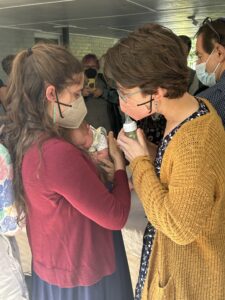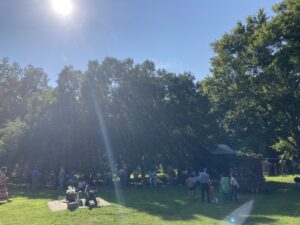Safety and Care
COVID-19 Pandemic Safety and Care Practices for Makom
As we grow our community almost four years into the ongoing pandemic, we are committed to practicing and modeling accessibility, which includes containing the spread of COVID and other infectious diseases in the absence of robust public health infrastructure. While there is still much we don’t know about COVID, there is a lot we do. Namely, there are long-term risks to contracting covid, and we can reduce transmission by adopting widespread masking in our community and cleaning the air.
We have adopted this guidance from the People’s CDC Safer Gathering toolkit and guidance to reduce transmission of COVID-19 through airborne transmission. Makom Accessibility is held across teams and Coco is responsible for community-wide concerns and decisions about accessibility practices.
Makom leadership has developed these Covid safety practices in alignment with our community values of Kehillah / Belonging, Tzitzit / Sacred Marginality, Tzedakah / Mutual Aid, Chesed and Gevurah / Care and Boundaries.
We are dedicated to each other’s physical, emotional, and spiritual well-being. We prioritize accessibility, orienting toward community members’ access needs; and strive to distribute resources to support each other.
We work towards a vision of community safety through solidarity where we keep each other safe. As queer and marginalized Jews and fellow travelers, we are in the lineage of a Judaism that recognizes the wisdom, vision, and creativity that can come from marginality.
Framing around Disability Justice and Collective Access (Updated December 2023)
While working towards systemic change, liberatory world-building can start with our own decisions and conversations with loved ones and community members about pandemic safety practices. We can shift culture by normalizing masking, caring for one another, and making ourselves accessible to immunocompromised and disabled kin. Rather than reacting with all/nothing thinking, we can practice pandemic safety in ways that feel doable and sustainable. And it is just that, a continuous commitment to reorienting our values and practicing embodiment. – ji-youn kim
This document strives to integrate the often conflicting access needs and experiences of sick, disabled, immunocompromised people, elders, those of us who work in settings where we may be more exposed, and parents of young children. Your personal practices may differ with parts of the policy. Through community, we practice taking responsibility for our collective well-being, which includes centering the participation and wisdom of disabled / high risk / immunocompromised people. We have adopted the model, based in our membership handbook’s guiding framework of hiyuv (sacred obligation) of the following community commitments.
Community Commitments:
From Makom:
- We will prioritize holding events outdoors and try to find a range of accessible outdoor spaces that are covered.
- When events are held indoors, Makom will provide high-quality (N95, KN95, KF94) masks and indoor air filtration, fans, and open windows where possible.
- As much as possible, especially when holding events indoors, we will offer a live streaming option for participants who can’t be in person.
- Makom team leads will hold the responsibility for making sure covid practices are upheld at events.
- All relevant pandemic safety and other accessibility info will be prominently and thoroughly explained in invites and event registration.
- Makom will cap indoor attendance at events to prevent overcrowding.
- Makom leadership will review care practices and commitments seasonally and update the community of changes via email.
From Community Members:
- Community members will not attend Makom events within five days of an active COVID exposure (defined as being indoors unmasked with someone who tests positive within three days).
- Community members will not attend events with cold or flu-like symptoms that are out of the norm for you.
- NOTE: We know for many chronically ill people in our community, flu-like or covid symptoms such as fatigue, brain fog, or muscle weakness are common day-to-day experiences. We are relying on people to make assessments based on what is “normal” for their body.
- When requested, RSVP-ing to events in advance: This allows us to make decisions about space in advance, know people’s access needs, etc.
- When at an indoor or crowded outdoor event, wear a well-fitting high-quality (KN94, KN95, or n95) mask that covers your nose and mouth. If you arrive at an event wearing a cloth or surgical mask, a Makom representative (or community member) will ask you to switch masks.
- Community members will review care practices and commitments seasonally in their entirety.
If you have tested positive for COVID-19 and are determining whether to join a Makom community event, we ask:
- For 10 days since onset of symptoms or if asymptomatic, your first positive test.
- That you test negative on two successive rapid tests, 48 hours apart.
Masking Protocols:
Makom masking protocols apply to everyone medically able to mask, including children over age 2 to the best of their ability. Masks will be available for those who don’t have their own/for whom the cost of masks is not accessible.
Indoor events
For all indoor events, we require snug-fitting, particulate masks (N95, KN95, or KN94) to be worn over the nose and mouth at all times.
Outdoor events
At outdoor events, we require snug-fitting, particulate masks (N95, KN95, or KN94) to be worn over the nose and mouth whenever a person is unable to physically distance (> 6 feet between every person). We ask that all people have their mask available throughout outdoor events and put on their mask as soon as distancing becomes difficult and/or when approaching a person wearing a mask.
Eating together
When food is served at Makom events, all meals will take place outdoors, or in sheltered spaces with high ventilation (like a park shelter or screened-in porch).
Masking Protocols for Event and Service Leaders
Event and service leaders are expected to follow our community masking protocols unless agreed upon in advance of an event. In some cases, an event or service leader may be unmasked for sound quality while they are leading. If this is the case extra effort will be put towards air flow/filtration around event leaders and anyone who must unmask will be asked to take extra individual precautions to reduce risk of transmission. Anyone who plans to unmask for an event is expected to take extra precautions (such as increased masking) the week leading up to an event and take a rapid test just prior to leading.
FAQ:
Why are you still requiring masks when most communities aren’t?
Most places forgoing masking requirements did so not because it was in alignment with collective health and well-being but for the desire to “go back to normal.” However, ignoring the continued reality of covid does not make it disappear. Currently (as of December 2023) there is more covid circulating than during more than 90 percent of the pandemic. We know that masking prevents the spread of covid-19 and that wearing a well-fitting mask along with cleaning the air, is the best way to prevent the transmission of covid and other airborne viruses.
When will this be over?
Because we can’t anticipate when the pandemic will be (actually) over, we will continue to evaluate these processes in alignment with covid numbers and engage in a community process before they change. We also know that for many disabled and immunocompromised folks, a standard cold or flu can be extremely risky—the pandemic has shown us new tools and strategies we can use to keep each other safe from many different viruses.
What if I can’t wear a mask?
If you can’t mask for medical reasons, please reach out to the event organizer.
I have another accessibility need.
Please let us know what we can do to make our community gatherings accessible to you! Reach out to info[at]makomtriangle[dot]org
